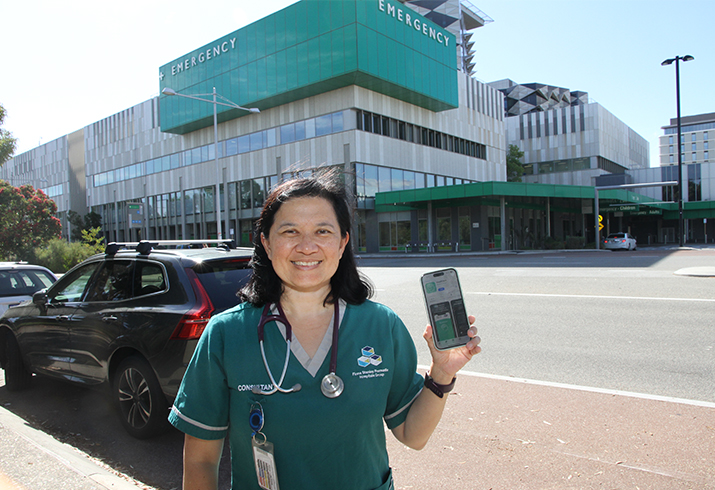SMHS is ‘appy’ with study to improve outcomes for patients with concussion
 SMHS Emergency Medicine Consultant Simone Bartlett with the HeadCheck app
SMHS Emergency Medicine Consultant Simone Bartlett with the HeadCheck app
Using app-based technology to better understand and improve the management of concussion, services across both Fiona Stanley Hospital (FSH) and Rockingham General Hospital (RGH) are collaborating with organisations across the country on the Australian Mild Traumatic Brain Injury (AUS-mTBI) Study.
The new Australian research uses a free, online app called HeadCheck (external site) to recruit Australians who’ve had a concussion in the last 14 days to be guided with personalised advice for the first 28 days after their injury and track their symptoms for up to 12 months.
Leading the research for SMHS are Emergency Medicine Consultants Simone Bartlett and Ben Smedley, who are part of the team of 100 researchers across the nation working to better understand and treat concussion through the study and the app.
“One in five people experience concussion in their lifetime, not only in sport, but also from falls, workplace injuries, accidents at home, motor vehicle crashes and assault,” Simone said.
“Additionally, about 30 per cent of people continue to have ongoing symptoms, including headache, dizziness and tiredness, and problems concentrating.
“Through the HeadCheck app, people who may be experiencing concussion symptoms can input their injury circumstances, lifestyle factors, and health history to receive personalised concussion care from the research team via the app," Simone said.
Ben said the study will use a predictive model that identifies people at risk of delayed recovery, allowing the researchers to further personalise recommendations within the app and evaluate improvements to care, optimising concussion recovery.
“Understanding what factors predict a delayed concussion recovery will enable timely and personalised care for those most at risk, improving patient outcomes,” Ben said.
People who sustain a concussion in the future may benefit from the study’s findings through improved prediction of people who are at risk of delayed recovery, enabling early detection and interventions for those most at risk of a poor outcome.
“We hope this research will build a detailed picture of concussion recovery across Australia and assist in our understanding of how people with non-sporting concussion recover,” Simone said.
Additionally, the study will create a database of concussion information for researchers to access for future concussion research, through the AUS-mTBI registry. Having a nationwide clinical registry of people who have experienced concussion is important to improve clinical decision making on patient care, and aid developments in new treatments and advances in healthcare research.
The AUS-mTBI Study is due to be completed by mid-2026, with data analysis and final reporting of results by the end of 2026. Download the app (external site) on the App store or Google Play.
The HeadCheck app was developed by Murdoch Children’s Research Institute, the Australian Football League and digital health technology company Curve Tomorrow. The study is being led by Curtin University’s Deputy Vice-Chancellor, Research, Professor Lindy Fitzgerald and is funded by the Australian Government Medical Research Future Fund, Mission for Traumatic Brain Injury and project partners include Curtin University, Perron Institute for Neurological and Translational Science, MCRI, Curve, Monash University, Edith Cowan University, The Queensland Brain Institute, Griffith University, The University of Sydney, Deakin University, the Djurali Heart Research Institute, the National Imaging Facility and peak organisations for people with brain injury, Synapse and Brain Injury Australia.
Keep up to date with our news and achievements
Find out more on Facebook (external site) or LinkedIn (external site)

